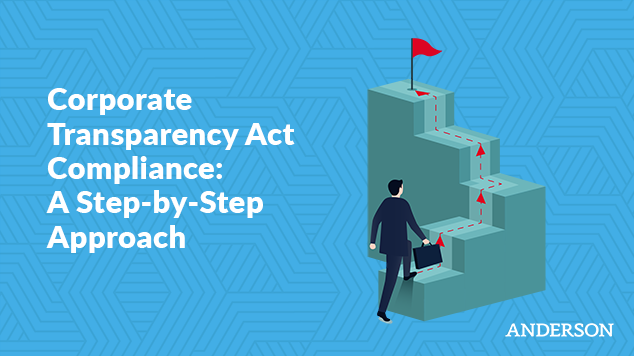
On Jan. 1, 2024, most businesses operating in the United States will find themselves subject to the Corporate Transparency Act (CTA), a bipartisan-approved legislation aimed at preventing illegal activities conducted through shell companies. Once the law goes into effect, reporting companies established before the effective date will have one year to comply, and those created afterward will have 30 days from the time of their formation. In either case, CTA compliance can be daunting, but viewing it as a process with smaller, more manageable components can help make it seem much more feasible.
Key Takeaways:
- Your business is probably subject to the CTA if it’s a corporation, a limited liability company, or an entity created or registered by filing a document with a secretary of state or similar office.
- Update your LLC operating agreement with a CTA-specific provision to help ensure internal compliance.
- You must provide FinCEN with identifying information about your company’s beneficial owners — individuals who exercise substantial control over the company or have at least 25% of its ownership interests.
- Reporting companies created or registered in the United States after Jan. 1, 2024, must also provide information about one or two company applicants.
- Make sure to include identifying information about your company in your report to FinCEN.
Tax & Asset Protection Workshop
Learn about Real Estate & Asset Protection at our next
FREE LIVE STREAM
A Step-by-Step Approach to CTA Compliance
Follow the steps below to ensure that your company is compliant with the CTA reporting requirement:
1. Determine Whether Your Company Is a Reporting Company
A reporting company is any business entity that is subject to the CTA. Though the law specifies 23 exemptions, the overwhelming majority of businesses operating in the United States do qualify as reporting companies. Broadly speaking, if you can answer “yes” to any of the following questions, your company is probably one of them:
- Is your company a corporation?
- Is your company a limited liability company (LLC)?
- Was your company created or registered by filing a document with a secretary of state or similar office?
Because the dual-tiered quality of the law may cause some uncertainty, we at Anderson Advisors have devised an online CTA quiz to help you confirm or disconfirm your business’ status as a reporting company. Just answer the questions and we’ll let you know whether you need to file.
If your business meets the criteria for exemption, there’s nothing else you have to do. Otherwise, keep reading to address the next action.
2. Update Your LLC Operating Agreement, If Applicable
If your business has an LLC operating agreement, a document that covers important elements such as member responsibilities and liabilities, now’s the time to update it with details pertaining to the CTA. Specifically, amend the agreement with a provision that requires all beneficial members to supply accurate personal information in compliance with the CTA, with refusal of adherence resulting in expulsion or financial compensation to the business. This step is all about incentivizing members who may otherwise resist CTA compliance, potentially saving you a lot of trouble down the line.
3. Identify Your Company’s Beneficial Owners
A beneficial owner is a member of your company who either directly or indirectly:
- Exercises substantial control over the company: This category includes but isn’t limited to senior officers, important decision-makers, and individuals authorized to appoint or remove officers,
- Owns or controls at least 25% of the company’s ownership interests: Ownership interest can mean equity, stock, voting rights, capital or profit interest, convertible instruments, options, or privileges, to name a few.
Your company may have multiple beneficial owners, and the CTA requires you to disclose information about all of them, except for those who qualify as any of the following five exemptions:
- Minors.
- Nominees, intermediaries, custodians, or agents acting on a beneficial owner’s behalf.
- Employees who are not senior officers and whose economic benefits from the company derive only from their employment status.
- Individuals whose only interest in the company is a future interest through inheritance.
- Creditors, or individuals who may meet the definition of a beneficial owner only because of their right to payment from the company, as through a debt.
4. Identify Your Company Applicant(s), If Applicable
A reporting company created or first registered on or after Jan. 1, 2024, must include information concerning at least one (at most two) of its company applicants in its report to the Financial Crimes Enforcement Network (FinCEN). An individual qualifies as a company applicant if they either:
- Directly filed the document that created or first registered the company.
- Held primary responsibility over directing or controlling said filing.
Common examples of company applicants are lawyers, paralegals, and corporate formation agents.
5. Gather Information About Your Company
Identifying information about your company is part of the report you file with FinCEN. These are the details you must provide:
- Full legal name.
- Any trade names or “doing business as” (DBA) names.
- Current U.S. address — the principal place of business or primary location in the United States.
- Jurisdiction of formation — state, tribal, or foreign.
- Jurisdiction of first registration — state or tribal (applies only to foreign reporting companies).
- Taxpayer identification number, including an employer identification number (or the foreign equivalent for foreign reporting companies).
6. Gather Information About Your Beneficial Owners
Collecting beneficial ownership information (BOI) is really FinCEN’s chief purpose regarding the CTA. For every beneficial owner you’ve identified in your business, gather the following details:
- Full legal name.
- Date of birth.
- Current residential address (can be a foreign address).
- Unique identifying number, as from a driver’s license, domestic passport, foreign passport, or other identifying document issued by a state, tribal, or local government.
- Scanned image of the identifying document described above.
Keep in mind that gathering BOI may be challenging if any of your members are resistant to the CTA requirements. Hopefully, you’ll have updated your LLC operating agreement to incentivize individual member compliance, as previously discussed.
7. Gather Information About Your Company Applicant(s), If Applicable
If your business is among those that needs to disclose information about a company applicant, the information you must gather is nearly identical to that of your beneficial owners. The only difference is that, instead of a residential address, you must provide a business address. Again, the address doesn’t have to be located in the United States.
8. Confirm the Accuracy of Your Information
At this point, review your gathered information to make sure everything is accurate and up to date. There’s no standard systematic approach to such fact-checking. Ideally, all you’ll have to do is cross-reference the provided details with supporting documents. If you suspect, however, that a beneficial owner has deliberately or inadvertently provided false information, discreetly address the matter in a manner you see fit.
9. File Your Report with FinCEN
Once you’ve gathered and confirmed all your information, it’s time to submit your formal report to FinCEN. You must do so electronically using FinCEN’s secure filing system. The system is still under development as of mid-October 2023, but it’s scheduled to become publicly available on Jan. 1, 2024. In addition, FinCEN will publish instructions and technical guidance on how to fill out the report form on the official BOI website.
Remember that you have a deadline. If your company’s creation or first registration precedes Jan. 1, 2024, the latest that you can file your report is Jan. 1, 2025. Otherwise, you have just 30 days from the effective date of creation or registration.
Free Strategy Session with an Anderson Advisor
Receive a detailed risk assessment to assist in lowering problem areas that could wipe out all of your assets with one wrong move. Speak with an Anderson Professional Advisor to get your FREE Strategy Session.
Limited-Time Offer: ($750 value.)














